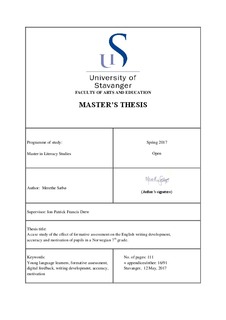| dc.description.abstract | This thesis is based on a study of the effect of formative assessment on 7th grade pupils’ written English development, accuracy and motivation in a primary school in Norway. The pupils were provided feedback digitally by the teacher as they wrote stories on Google Chrome Book during a two-week intensive writing project. The ability to express oneself in writing and digital competence are two of the five basic skills in the Norwegian LK06 curriculum. The research was conducted in a primary school class of 38 pupils, aged approximately12, and their teacher. Mixed methods were used (i.e. quantitative and qualitative), where the data collection consisted of pre- and post-project semi-structured interviews with the teacher, classroom observations, an analysis of six pupils’ texts, and a pupil questionnaire.
The study showed that formative assessment had a positive effect on both the pupils’ writing development and accuracy. This was first and foremost verified by the pupils’ accomplished corrections in their texts based on the formative assessment provided by the teacher. The amount of work the pupils put into improving their texts showed that they were able to take advantage of the provided formative assessment in order to develop their texts, their meta-language, and take an active part in their own learning. Furthermore, the formative assessment also had a positive effect on the pupils’ motivation, especially when they were writing on computers in the first part of the writing project, despite the fact that the feedback led to a good deal of work for the pupils. The pupils’ motivation was also revealed in the eagerness and dedication they showed throughout the entire writing project. The teacher’s experience of formative assessment was positive and she was convinced that providing formative assessment was more beneficial than summative assessment. Finally, the pupils experienced the formative assessment provided by the teacher as helpful, understood its value, and how it helped their development as writers.
The present study has contributed to the limited research on the writing of young language learners and the effect of formative assessment on their writing provided through digital feedback. As far as the researcher is aware, digital feedback to young learners’ writing in English has not previously been researched in a Norwegian context, and the researcher is unaware of similar research outside of Norway. The research has provided insight into the process of how the pupils developed as writers and became more accurate in their writing. Since a new curriculum is planned from autumn 2020 in Norway, where ‘deep learning’ is one of the key words, pupils will need to use their abilities to analyse, solve problems and reflect on their learning to construct a lasting understanding. Hence, it is recommended that other teachers consider teaching writing in similar ways as conducted in this writing project. | nb_NO |
